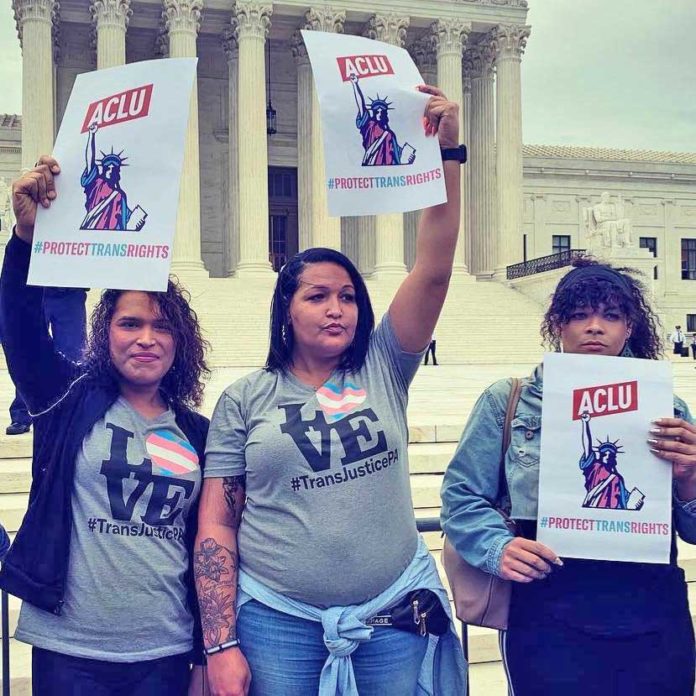Pennsylvania’s American Civil Liberties Union (ACLU PA) chapter, through an initiative called Trans Justice, is pushing to decriminalize sex work in Philadelphia by 2021. As part of this initiative Trans Justice Coordinator Naiymah Sanchez, a trans woman and former sex worker, distributed a survey to trans and nonbinary sex workers in Philadelphia in order to expand on the current research.
When Sanchez attended a conference on the struggles of trans people in the sex industry, she found the work inspiring but also realized that there was no one who identified as trans at the podium. The reason for this survey, explained Sanchez, is to gather much-needed data on trans people who are engaged in sex work in Philadelphia. She hopes that the data gathered will serve to supplement statistics reported by organizations whose focus tends to be on cisgendered sex workers.
Sex work appears nowhere in the Title 18 federal crimes code. Rather, sex work is a state offense; it is currently a crime in all 50 states to sell or buy sex. It is very much in the state’s hands to change its criminal code pertaining to sex work. There are two schools of thought when it comes to changing the legal status of sex work: Full decriminalization and partial-decriminalization (also known as the Nordic model). Full decriminalization means legalizing sex work for both the sex worker and the sex buyer. Partial decriminalization legalizes only the practice of selling sex but criminalizes the act of buying sex. The ACLU, along with organizations like Amnesty International, has a pro-sex work, full decriminalization stance. But some organizations, such as the Villanova Institute to Address Commercial Sexual Exploitation, champion the Nordic model, calling it the only system that has a proven track record of lowering trafficking rates.
The argument for various decriminalization legislation has become a divisive issue even amongst those who work in the sex industry. Jesse, a pansexual former webcam model, is in favor of full decriminalization. “I feel very positively about [full decriminalization],” said Jesse, “I think there’s really no downside to it from most standpoints. It tends to take power away from people who exploit sex workers and abuse sex workers. With most things, like alcohol and access to birth control, when you make something illegal, you don’t really stop it from happening, you just make it more dangerous.”
Conversely, Sara, a self-identified former “stripper and prostitute,” believes that decriminalization will do nothing to protect sex workers. “Sex workers have always existed on the margins of society — LGBT sex workers especially so,” said Sara, “Our clients, however, are usually men with jobs and families and 401ks. This creates an imbalance of power that allows clients to take advantage of sex workers. Full decriminalization does nothing to pull sex workers out of the margins of society. It doesn’t make us ‘respectable.’ Nor does it do anything to put us and our client on equal footing. The only person full decriminalization benefits is the client. It doesn’t do anything for me.”
Despite the ACLU being in favor of full-decriminalization, Sanchez said that neither herself nor ACLU PA is pushing for either method explicitly. “It’s a conversation that needs to be had,” said Sanchez. Of the broader argument for the decriminalization of sex work, Sanchez said it’s inextricably linked to the disproportionate rate of transgender people who are incarcerated on sex work-related charges. Lambda Legal’s 2012 Protected and Served? survey indicated that transgender and gender-nonconforming respondents (10%) were nearly twice as likely to be imprisoned than their LGB counterparts.
Sanchez said that decriminalization of the sex trade will also aid in de-carcerating Philadelphia prisons. If sex workers and those who buy sex are no longer committing a crime, prisons will be emptier. “I had 17 charges of prostitution—” explained Sanchez, “not prostitution per se, but solicitation, loitering on the highway, trespassing. These all resulted from me engaging in survival sex work. I’ve also sat in jail for pretrial for months for sex work charges. I was given bail — but I couldn’t pay a $1000 bail. I couldn’t even put a roof over my head. I am being criminalized in jail; I am being criminalized in society for trying to meet my needs.” That’s what the survey is about, continued Sanchez, it’s about identifying the factors that lead to people becoming sex workers and the barriers that prevent them from doing other work. “It’s about uplifting the experiences of those who are impacted,” finished Sanchez.
While the ACLU PA survey is anonymous, it does provide a section where respondents can give their name and contact information if they want to be involved in ACLU PA’s mission. Additionally, the survey requires the respondent’s age.
Sanchez pointed to some sobering statistics: Of the 29 folks who completed the survey online, 22% of them were under 18 and 66% were in the age bracket of 18-24; this means that 88% are under the age of 25. In the United States, it is a federal crime for a person under the age of 18 to engage in sex work.
“What are we missing here in Philadelphia?” said Sanchez, “We need to engage with this. I think this is an awakening for our city.”
To participate in the ACLU PA survey, you must be a trans or nonbinary person working in the Philadelphia sex industry. Access it online or call Naiymah Sanchez at (267)-625-2850.
If you or someone you know needs help as a result of sex trafficking, the Polaris Project’s U.S. National Human Trafficking Hotline can be reached at 1-888-373-7888 or by texting “BeFree” to 233733.
